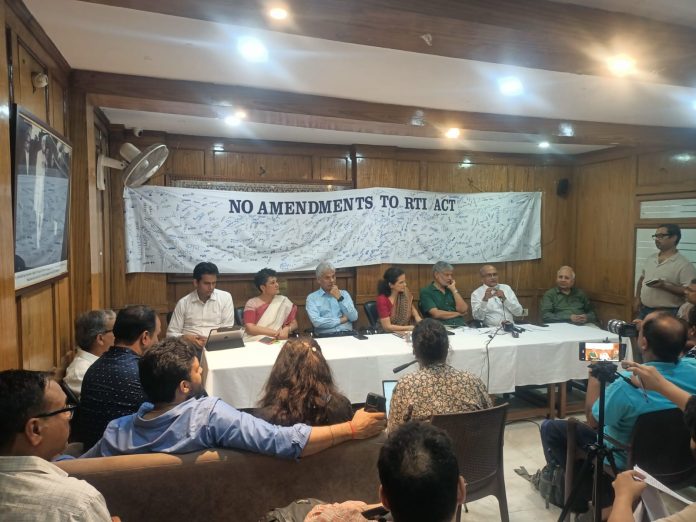– Mohd.Naushad Khan
A coalition of journalist bodies and civil society groups has stepped up efforts demanding a rollback of recent RTI Act amendments. These changes were quietly introduced through the Digital Personal Data Protection (DPDP) Act, 2023. The “Roll Back RTI Amendments Campaign” is led by the National Campaign for the People’s Right to Information (NCPRI). It is backed by over two dozen media groups. They say the new data law harms transparency, reduces accountability, and endangers press freedom.
The key issue lies in the amendment to Section 8(1)(j) of the RTI Act. Earlier, personal information could be denied only if unrelated to public interest or caused an unwarranted invasion of privacy. The new law expands the definition of personal information. Critics say it lets authorities deny access to public-interest data by simply calling it “personal.”
At a joint press conference on July 30, leading media bodies like the Press Club of India (PCI), DIGIPUB Foundation, and regional press clubs spoke out. They warned the changes would hurt the media’s role in exposing corruption. Anjali Bhardwaj of NCPRI said the DPDP Act has no journalist exemption, unlike the EU’s GDPR. She said this could silence investigative journalism and hurt democratic debate.
Bhardwaj noted that the law classifies journalists as “data fiduciaries.” This means they must get written consent to collect and publish personal data. She warned this would make reporting hard and shield the powerful from scrutiny. She also pointed out that the law removes a key safeguard: the right to access info available to Parliament.
Earlier this month, journalist representatives met Union IT Secretary S. Krishnan. PCI Vice President Sangeeta Barooah Pisharoty said Krishnan promised the DPDP Act would not limit journalism. He said a “Frequently Asked Questions” (FAQ) document would clarify doubts. But journalists and legal experts rejected the idea. They argued that FAQs have no legal value in court.
Pisharoty said they need legal protection, not just FAQs. She criticized the deletion of a journalist exemption from the 2018 draft bill. That version was recommended by the Justice B.N. Srikrishna Committee. She said, “Who qualifies as a journalist cannot be decided by the government.” She added that over 1,000 journalists from 22 elected bodies had signed a memorandum demanding change.
Retired Justice A.P. Shah, former Law Commission chair, strongly opposed the amendment. In a letter to the Attorney General, he called the law a “seismic shift” in transparency. He said it lets authorities deny access to information just by labelling it personal, even when it serves public interest. He called for a constitutional challenge.
Legal activist Apar Gupta echoed Shah’s concerns. He said the amendment breaks the balance between privacy and the right to know. He warned it could block data vital to public interest. Without transparency, he said, there is no accountability.
Civil rights activist Nikhil Dey warned of wider harm. He said the law affects people trying to get welfare or check public spending. The poor, he said, are being forced to give up privacy for benefits, without a promise of either privacy or information. Dey tied the issue to the 2017 Supreme Court Puttaswamy judgment. That ruling upheld privacy as a fundamental right, but also affirmed that the right to information is vital for democracy.
Senior advocate Prashant Bhushan added that the government has not yet issued final DPDP rules. He said comments were submitted on the draft, but no clarity was offered. He called it “evasion, not governance.” He urged the Ministry of Electronics and IT (MeitY) to complete the process and hold public consultations.
Activists also raised concerns about how the Data Protection Board is being formed. They said the lack of transparency in appointing board members reduces trust in the law’s fairness.
The campaign to reverse the RTI amendments is growing. It has support from journalists, legal experts, and civil groups. They want the RTI Act’s original clauses restored. They also demand special protections for journalists. Meanwhile, IT Minister Ashwini Vaishnaw has not met with media bodies, despite promises made by Mr. Krishnan.
As debate grows over balancing data protection and transparency, campaigners are sending a clear message. Privacy and transparency should not conflict. They must work together to support democracy, citizen rights, and press freedom.




